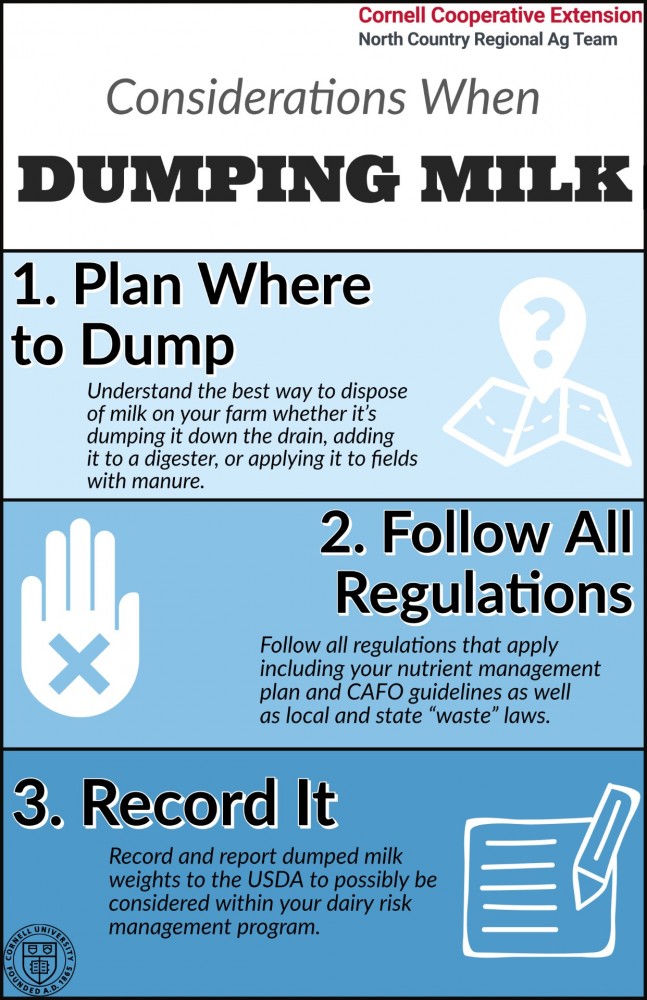Considerations for Dumping Milk
Alycia Drwencke, Dairy Management Specialist
Southwest New York Dairy, Livestock and Field Crops Program
With reports of milk being dumped from some farms across the state and nation, there are a few considerations to keep in mind should your farm or cooperative unfortunately end up in this situation.
First, our colleagues on the North Country Regional Ag Team put together this 3 step info-graphic.
1. Plan Where to Dump - Have an idea of the best place on your farm to dispose of milk, should you need to.
2. Follow All Regulations - Environmental regulations don't go out the window in these times, making it important to continue to comply with any nutrient management plans, CAFO guidlines, and local or state laws.
3. Record It - Track all weights of dumped milk to report to the USDA and possibly be included in your dairy risk management program.

This 3 point info-graphic nicely summarizes some of the longer pieces on this topic.
Karl Czymmek and Peter Wright with Cornell PRO-DAIRY, wrote "Processors and Farmers: These are unprecedented times and we should be aware of a range of possibilities, including changes in milk demand."
The further discuss by saying: "While we hope that milk demand remains strong, should the situation change resulting in a surplus, farmers and handlers should review the items below to make sure surplus milk is managed appropriately.
Typically, when milk is long, haulers will continue to stop at farms to pick up milk so volume, quality and components can be measured. The tried and true process is to deliver this milk to farms with adequate manure storage capacity and unload the milk into the storage. Depending on the milk to manure ratio, there may be a higher than normal odor factor from this mix due to the high energy content of milk, especially during agitation and land application.
Receiving farms should have the capacity to inject or incorporate the resulting manure/milk mix in order to manage odors. This may reduce odor and potential fly issues resulting from land application. In some cases, milk could be mixed with manure and added to an anaerobic digester before being sent to storage. Farms with a renewable natural gas contract may have an agreement that prohibits offsite substrates from being added to the digester. If you have an agreement with an outside entity, double check that milk or other substrates are allowed. For all CAFO farms, importing milk could impact your nutrient management plan, so be sure to talk to your planner about how to manage additional nutrients coming to, or not being exported from, the farm."
Additionally, Progressive Dairy published an article discussing the various locations you can dump milk and having your dump milk count in more detail.
Should you find yourself in the unfortunate situation of having to dump milk, following these considerations will help prevent further harm to your business. If you would like to discuss additional management decisions, contact Dairy Management Specialist, Alycia Drwencke at 517-416-0386 or amd453@cornell.edu. For economic considerations, reach out to our Farm Business Management Specialist, Katelyn Walley-Stoll.
Upcoming Events
Piglet Health 101
February 13, 2026 : Piglet Health 101 - Batavia, NY
Batavia, NY
This free workshop from the New York Pork Producers offers hands-on training in essential piglet care and processing practices, led by industry veterinarians from Passion for Pigs. No matter your experience level, this training offers takeaways for both new and experienced producers.
Boots in the Barn: Cornell Dairy Research Updates
January 13, 2026
January 20, 2026
January 27, 2026
February 3, 2026
February 10, 2026
February 17, 2026
February 24, 2026
Join us for some or all!
2026 No-Till & Cover Crop Conference
February 19, 2026 : 2026 No-Till & Cover Crop Conference
South Burlington, VT
Announcements
Cows, Crops & Critters Newsletter Sponsorship
TRYING TO REACH GROWERS AND AGRIBUSINESSES IN OUR SOUTHWEST REGION OF NEW YORK?Weekly Email Update: Shared with 625+ households who have signed up with our program.
Monthly Paper Mailer: To reach our stakeholders and farmers who lack internet access, we send out a monthly mailer where your company's logo and contact information would be featured with a mailing list of 330+ households.
If you sponsor our weekly and monthly publications you reach approximately 955 households.





